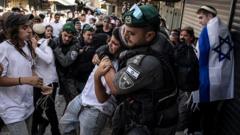Crowds of far-right Israelis erupted in violence against Palestinians on Monday during an annual parade marking Jerusalem Day, which commemorates Israel's capture of Palestinian-majority East Jerusalem during the 1967 Arab-Israeli war. The event was marred by chants of "death to Arabs" as ultranationalist Jews entered Palestinian neighborhoods, particularly confronting residents near Damascus Gate.
Opposition Leader Yair Lapid criticized the march as a display of "hatred and racism," labeling it a disgrace to Judaism. The atmosphere turned hostile when thousands of Israeli nationalists gathered, brandishing banners declaring "67 - Jerusalem in our hands; 2025 - Gaza in our hands." As altercations increased, Israeli police intervened, detaining aggressive marchers.
Adding to the tensions, National Security Minister Itamar Ben Gvir advocated for the death penalty for "terrorists," during his address at the event. He also visited the Al-Aqsa mosque compound, a site of significant religious importance for both Muslims and Jews, further inflaming grievances among Palestinian observers.
A spokesman for the Palestinian presidency condemned the march and Ben Gvir’s actions, warning that such provocations jeopardize regional stability. In a cabinet meeting, Israeli Prime Minister Benjamin Netanyahu asserted that Jerusalem must remain "united, whole, and under Israeli sovereignty."
Images capturing the violence were met with strong rebukes from opposition figures, including Leftwing leader Yair Golan, who referred to the scenes as indicative of a societal breakdown characterized by "hatred and bullying." Leaders Lamid and Golan demanded a more inclusive vision for Jerusalem, urging that the city belongs to all who cherish it—Jews, Christians, and Muslims alike.
Jerusalem Day is traditionally marked by thousands of Israeli participants marching through the annexed Old City, concluding their route at the Western Wall, the holiest site for Jewish prayer. This year's observance coincides with escalated hostilities in Gaza, as Israel intensifies military operations against Palestinian militants following a Hamas-led attack earlier in October.
The ongoing conflict has resulted in tremendous casualties; since the outbreak of violence, reports indicate that over 53,939 people, including many children, have died in Gaza. The clash on Jerusalem Day thus unfolds against a backdrop of a deeply polarized landscape, with both sides asserting claims over the historically contested city.





















